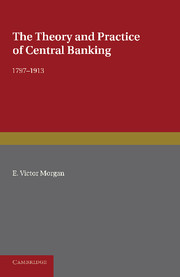Book contents
- Frontmatter
- Contents
- Tables
- Editorial Preface
- Author's Preface
- Chapter I Banks and Banking in the Early Nineteenth Century
- Chapter II The Bank Restriction Period, 1797–1821
- Chapter III Monetary Theory of the Bank Restriction Period
- Chapter IV The First Years of Resumption, the Crisis of 1825, and the Bank Charter Act, 1833
- Chapter V The Horsley Palmer Experiment, and the Bank Charter Act, 1844
- Chapter VI The Currency and Banking Controversy
- Chapter VII The Trial of the Bank Charter Act, 1844-58
- Chapter VIII The Great Boom, 1858-73
- Chapter IX The Great Depression, 1873-96
- Chapter X The Last Years of the Gold Standard, 1897–1913
- Chapter XI Monetary Theory of the Second Half of the Nineteenth Century
- Appendix Changes in Bank rate, 1876-1913, with the Amount of the Reserve of the Banking Department and the “Proportion” on the preceding Wednesday
- Index
Chapter II - The Bank Restriction Period, 1797–1821
Published online by Cambridge University Press: 05 June 2016
- Frontmatter
- Contents
- Tables
- Editorial Preface
- Author's Preface
- Chapter I Banks and Banking in the Early Nineteenth Century
- Chapter II The Bank Restriction Period, 1797–1821
- Chapter III Monetary Theory of the Bank Restriction Period
- Chapter IV The First Years of Resumption, the Crisis of 1825, and the Bank Charter Act, 1833
- Chapter V The Horsley Palmer Experiment, and the Bank Charter Act, 1844
- Chapter VI The Currency and Banking Controversy
- Chapter VII The Trial of the Bank Charter Act, 1844-58
- Chapter VIII The Great Boom, 1858-73
- Chapter IX The Great Depression, 1873-96
- Chapter X The Last Years of the Gold Standard, 1897–1913
- Chapter XI Monetary Theory of the Second Half of the Nineteenth Century
- Appendix Changes in Bank rate, 1876-1913, with the Amount of the Reserve of the Banking Department and the “Proportion” on the preceding Wednesday
- Index
Summary
CAUSES OF THE RESTRICTION
War with France, which was declared in January 1793, produced a severe commercial crisis, in which the government intervened with advances of Exchequer bills to traders in distress. But events soon resumed a fairly normal course, and it was not until 1795 that serious banking difficulties began. These difficulties fall into two phases, a foreign drain of gold and then, after this had been stemmed, a run on the banks at home.
The demands for bills on foreign centres created by our military and naval activities were accentuated by a guaranteed loan of £4 mn. to Austria. A further demand for gold was created by the collapse of the French assignats, and the return of France to a completely metallic standard. The exchanges began to fall in March 1795, were below gold export point in May, and so continued until December 1796, by which time the reserve of the Bank had been greatly depleted.
The government continued to raise large sums by loan, and to demand advances from the Bank in spite of the protests of the directors. In December 1795 the directors decided to ration private discounts, a policy for which they were severely censured. Meanwhile, with trade recovering, and prices rising, there was a general demand for money, and that which the Bank of England would not provide was supplied by the country banks, often with very inadequate reserves. The final cause of the suspension of cash payments was the landing of a small French force at Fishguard; this caused a panic run on the country banks, who, in turn, presented their Bank of England notes for payment.
By an order in council of 27 February 1797 the Bank was forbidden to make any payments in specie except for the armed forces abroad, and except that it might repay half of any sum of over £500 subsequently deposited in gold with it. The suspension was confirmed by Parliament on 3 May, and the act was successively renewed, so that it did not finally expire until 1821. Three days previously another act had authorised the issue of notes of less value than £5.
- Type
- Chapter
- Information
- The Theory and Practice of Central Banking, 1797–1913 , pp. 23 - 48Publisher: Cambridge University PressPrint publication year: 2013



